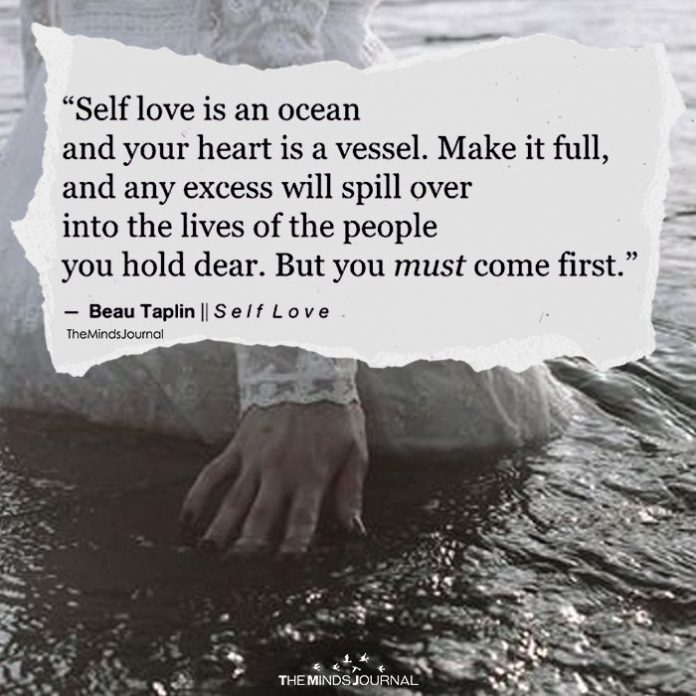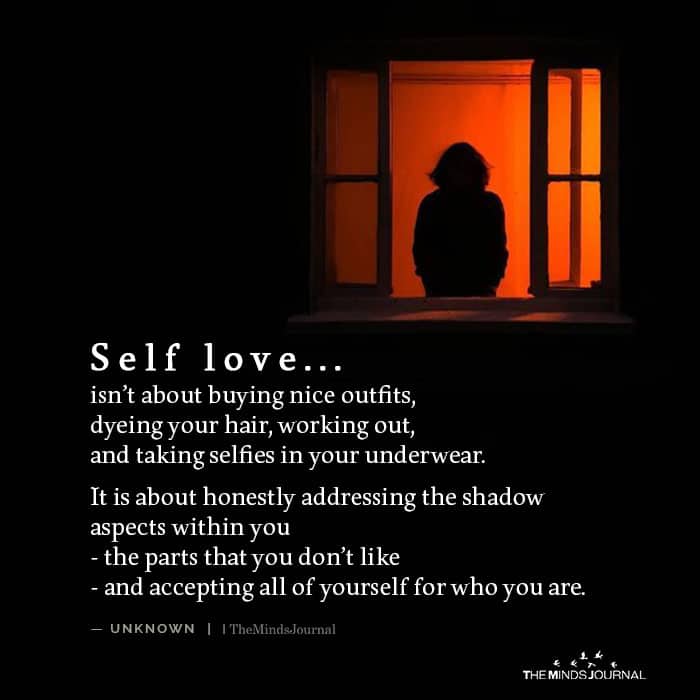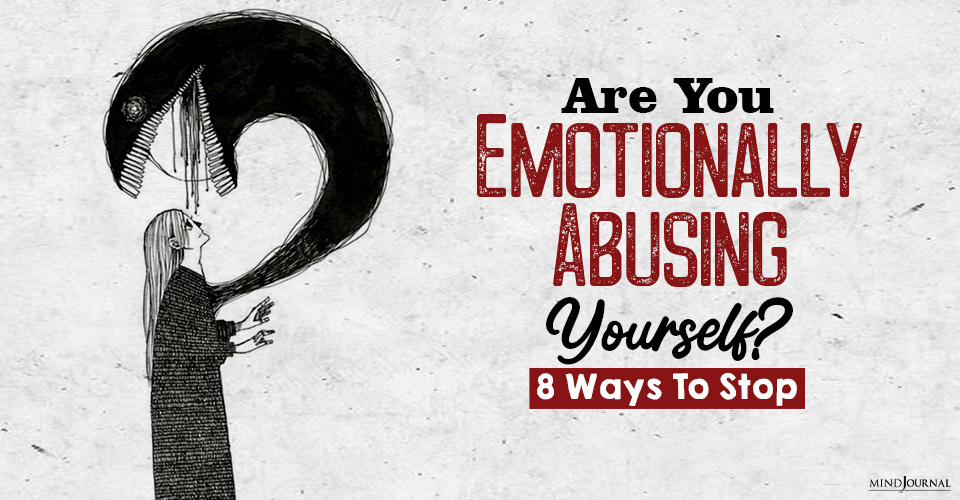Are you emotionally abusing yourself all the time, without even realizing that you’re doing it? How many times have you told yourself mean things, and broken your own heart and self-confidence in the process? Excessive self abuse and self-criticism is just another way of emotionally abusing yourself, and putting yourself down.
A certain amount of self-criticism is important for developing self-awareness and staying humble, but when you do it too much, it can take a toll on your emotional and mental health and make you doubt yourself all the time. When you self abuse yourself like this (and it doesn’t always have to be physical), you’re giving your soul the message that you deserve this pain.
Your biggest critic is you and your inner critic. Like I mentioned above, it is okay to be a little hard on yourself sometimes, but if it becomes a habit and you keep on doubting yourself and putting yourself down, that’s when it becomes a problem.
If your inner critic is an especially harsh one who is always pushing you to emotionally self-harm and self-destruct yourself, then there might be a couple of deep-rooted reasons behind that.
Related: 25 Signs You Have a Wounded Inner Child and How to Heal
How Are You Emotionally Abusing Yourself?
Sometimes when you talk to yourself, you tend to put yourself down without realizing it. You might think that you are just trying to be strong and more resilient, but the truth is constant self-deprecation can end up making you hate yourself. If this keeps on happening, it’s just a matter of time before your self-confidence and self-belief crumble, and you are left to pick up the pieces of the pain of your hurt and lost self.
Here are some of the most common things you say to yourself that shows you’re emotionally abusing yourself:-
- “I’m not good enough for him!”
- “I messed up. Again!”
- “I’m fat and ugly!”
- “I will never be successful in life!”
- “I’m not worthy of love and I’ll die alone!”
- “I’m too sensitive. I need to toughen up.”
- “I will keep my opinions to myself, because they aren’t worth anything.”
- “I can’t do anything right!”
- “I am worthless and a waste of space.”
- “I am stupid and everyone hates me.”
- “I have an ugly body and I hate it. No wonder nobody wants to go out with me.”
- “I am the reason my loved ones are unhappy.”
- “I am a burden on everyone I love.”
- “I don’t have the right to expect anything good from others.”
- “I shouldn’t have any dreams, because I am not smart or talented enough to fulfill them.”
- “I am always wrong!”
- “I am a needy and clingy person, so I should just keep my mouth shut and mind my own business!”
Why You Emotionally Abuse Yourself
Why do you treat yourself this way? Why do you always keep on insulting yourself and putting yourself down? Everything we do has a reason behind it, and do does this. If you’re constantly emotionally abusing yourself, then there might be a couple of deep-seated reasons behind it.
These might be some probable causes behind you emotionally abusing yourself constantly:-
- Traumatic childhood.
- Emotional and psychological abuse by your parents.
- One or both parents abandoning you.
- Getting cheated on multiple times in adult relationships.
- Being in toxic, abusive, and dysfunctional relationships.
- Over-critical parents or partner.
- Experiencing traumatic events like bullying, sexual harassment and other forms of abuse.
- Negative self-talk.
- Lack of appreciation and warmth from loved ones.
- Experiencing neglect and frequent punisment.
- Being made to deal with the problems and stress of your parents when you were a child,
However, you can break this emotionally abusive cycle if you want, and understanding where it’s all stemming from is a good first step. There is always light at the end of the tunnel, and these are just a few ways with the help of which you can stop emotionally abusing yourself.
8 Ways You Can Stop Self Abuse
1. Cut toxic and abusive people out of your life for good.
Cutting out toxic people from your life can help you find mental peace, and also work towards restoring your self-confidence and self-esteem. Toxic and abusive people do nothing but destroy the happiness in your life, and the worst part is that they don’t care how it hurts you and affects you.
So cutting them out is the only option you have if you want to hold on to your sanity and emotional well-being. However, cutting out family can be a challenge so in such cases you can draw boundaries and let them know that they need to respect that.
You can also maintain distance from them in order to curb their influence on you and your life. If they don’t change their ways, you can always leave the room and walk away, because your mental health is always more important.
Related: 6 Positive Psychology Practices To Boost Happiness
2. Treat yourself with compassion and kindness every single day.
The only person who will always be there for you is YOU, and one of the best ways to stop emotionally abusing yourself is by treating yourself with some much-needed respect and kindness. Compliment yourself every day, hype yourself up before going out for work, focus on being optimistic, and have faith in yourself that you’re doing the best you can.
When you believe in yourself, it shows on the outside too. When you are self-assured and confident about who you are and be your authentic self, there’s nothing anybody can do to hurt you. Being kind to yourself is an act of self-love and one that you need to practice every single day of your life.

3. Work on your overthinking and see it for what it is: a curse.
Overthinking never does anyone any good, and the more you indulge in it, the worse it gets. If you are always living in your head, and are trapped in a vicious cycle of negative and self-deprecating thoughts, then happiness and peace will always seem like distant dreams.
If you keep on thinking that you’re not talented enough, not good-looking enough, not smart enough, not successful enough, etc. you are always going to be miserable, no matter how much someone might try to help you. You need to get out of your head and stop feeding your overthinking so that you can have a true shot at happiness.
Related: 10 Signs Of Self-Hatred And How To Overcome
4. Think about why you keep on emotionally abusing yourself and what you get from it.
Sometimes you need to ask yourself a few questions to better understand why you keep on mistreating yourself, day in and day out. Why do you keep on emotionally abusing yourself? How does it make you feel? Is it because it makes you feel like a victim and that thought process helps you deal with everything a bit better? And most importantly, do you actually want to stop doing it?
No matter how hard and uncomfortable these questions might be, only you have the answers to them. Ask yourself these questions and be honest with yourself. The truth is no matter how badly your parents and other people might have treated you, you always have the option to try and move on from that abuse and mistreatment.
You have the power to change your story and move on to better things in life, instead of holding on to the toxic ones. It’s not going to be an easy journey, but definitely a rewarding one in the long run.
5. Be assertive about what you want, and what you DON’T want.
Draw some strong boundaries and decide what you will accept and what you won’t. Let people know when they hurt you or make you feel insulted, and tell them why they should stop doing that. If someone close to you mistreats you, call them out on their behavior and forbid them from doing it again.
One of the strongest ways to make sure that you stop emotionally abusing yourself is to take a stand for yourself. The moment you treat yourself with respect and show assertiveness in front of toxic, abusive people, is the moment you will finally turn your life around.
Related: 8 Struggles Of People Who Are Too Hard On Themselves
6. Joining a support group can help you deal with your emotionally abusive tendencies.
If you feel like there’s nobody you can talk to about this in your life, then maybe joining a support group might be a good idea. Support groups can help you feel seen, heard, and understood, and on top of that, nobody will judge you. It will be a safe, judgment-free zone for you where you can pour your heart out without any fear and hesitation.
Support groups do not just help you express your feelings, they also push you to deal with them healthily and work towards moving on in your life. All the emotional abuse and humiliation that you’ve suffered over the years, you will not just deal with it all, but at the same time, you will also take the right steps to heal from it all.

7. Practice positive affirmations.
Studies have shown that positive affirmations can really help you deal with your negative thoughts, and stop you from emotionally abusing yourself. It is a powerful tool that can actually help you build your self-confidence, and self-esteem and also make sure that you don’t mentally torture yourself over and over again.
But the thing with positive affirmations is that you need to genuinely believe them in order for them to work and make a difference in your life. For instance, if you tell yourself every day that “I AM worthy of good things in life”, but you don’t mean a single word of it, then nothing’s going to change.
You have to be willing to open up your heart and let all the good things into your life. After a point, you need to let go of all that pain, resentment, bitterness, and negativity and open the door to a more positive and fulfilling life.
Related: 8 Steps To Improving Your Self-Esteem
8. Go for therapy.
Therapy can really help you a lot when it comes to dealing with something like this. If you are finding yourself at a dead-end where despite everything you are doing, you still feel the same, then therapy might be your next best option. A qualified therapist can help you understand why you’re doing this to yourself, and give you the necessary tools with the help of which you can change your life for the better.
They can help you deal with your self-destructive tendencies and encourage you to see yourself from a different and more positive perspective. Therapy and counseling can tremendously help you deal with your trauma and before you know it, you will start feeling better.
Want to know about the signs of self abuse? Check this video out below!
In order to stop emotionally abusing yourself, you need to understand what’s going on and what you’re doing to yourself. If you keep on tormenting yourself constantly, it will just be a matter of time before you turn into a shell of the person you are. Love yourself, be kind to yourself, do what makes YOU happy, and most importantly, believe that you deserve a lot of good things in life.
And never ever let anybody tell you or make you feel otherwise.











Leave a Reply